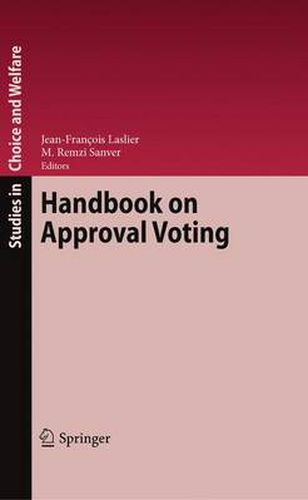Readings Newsletter
Become a Readings Member to make your shopping experience even easier.
Sign in or sign up for free!
You’re not far away from qualifying for FREE standard shipping within Australia
You’ve qualified for FREE standard shipping within Australia
The cart is loading…






This title is printed to order. This book may have been self-published. If so, we cannot guarantee the quality of the content. In the main most books will have gone through the editing process however some may not. We therefore suggest that you be aware of this before ordering this book. If in doubt check either the author or publisher’s details as we are unable to accept any returns unless they are faulty. Please contact us if you have any questions.
I am honoredto write a prefaceto this remarkablybroadand comprehensivevolume on approval voting (AV). It has been almost 35 years since Peter C. Fishburn and I met in 1976 and began research on AV. Besides my 30-year collaboration with Fishburn, I have collaborated with several other scholars - including D. Marc Kilgour,SamuelMerrill,JackH.Nagel,M.RemziSanver,andWilliamS.Zwicker- on AV-related research. Over these years there has been a profusion of articles and books reporting on empirical and theoretical aspects of AV and their normative implications. This volume touches on all aspects of this research and will be a very helpful sourcebook to scholars who want to carry this research forward. In Brams and Fishburn (1983/2007, p. 172), Fishburn and I were unabashed in our support of AV: Approval voting strikes at the heart of how political debate is resolved. It offers a new approach to the realization of democratic principles by rede ning what constitutes a de- cratic choice. Indeed, the foundation on which representative government is built is periodic elections, and the central problem of elections today is how to translate voter preferences, with as little distortion as possible, into consensus choices in multicandidate races. We believe that approval voting is the best practical way for amalgamating these preferences, fairlyand impartially,toproduce awinnerand thereby amelioratethemulticandateproblem.
$9.00 standard shipping within Australia
FREE standard shipping within Australia for orders over $100.00
Express & International shipping calculated at checkout
This title is printed to order. This book may have been self-published. If so, we cannot guarantee the quality of the content. In the main most books will have gone through the editing process however some may not. We therefore suggest that you be aware of this before ordering this book. If in doubt check either the author or publisher’s details as we are unable to accept any returns unless they are faulty. Please contact us if you have any questions.
I am honoredto write a prefaceto this remarkablybroadand comprehensivevolume on approval voting (AV). It has been almost 35 years since Peter C. Fishburn and I met in 1976 and began research on AV. Besides my 30-year collaboration with Fishburn, I have collaborated with several other scholars - including D. Marc Kilgour,SamuelMerrill,JackH.Nagel,M.RemziSanver,andWilliamS.Zwicker- on AV-related research. Over these years there has been a profusion of articles and books reporting on empirical and theoretical aspects of AV and their normative implications. This volume touches on all aspects of this research and will be a very helpful sourcebook to scholars who want to carry this research forward. In Brams and Fishburn (1983/2007, p. 172), Fishburn and I were unabashed in our support of AV: Approval voting strikes at the heart of how political debate is resolved. It offers a new approach to the realization of democratic principles by rede ning what constitutes a de- cratic choice. Indeed, the foundation on which representative government is built is periodic elections, and the central problem of elections today is how to translate voter preferences, with as little distortion as possible, into consensus choices in multicandidate races. We believe that approval voting is the best practical way for amalgamating these preferences, fairlyand impartially,toproduce awinnerand thereby amelioratethemulticandateproblem.